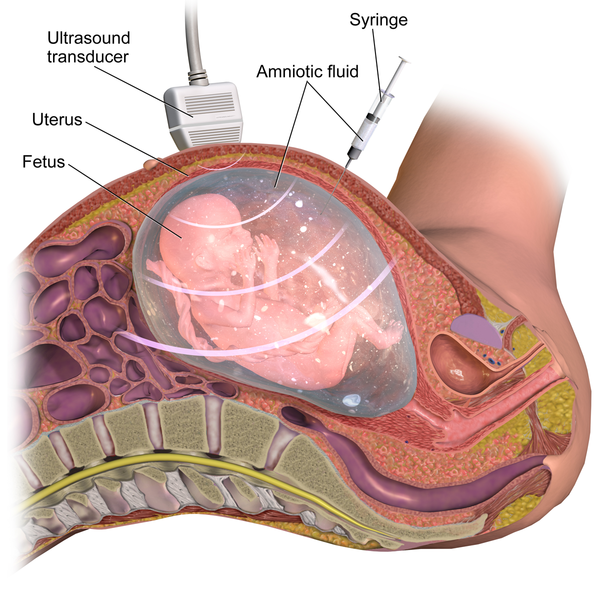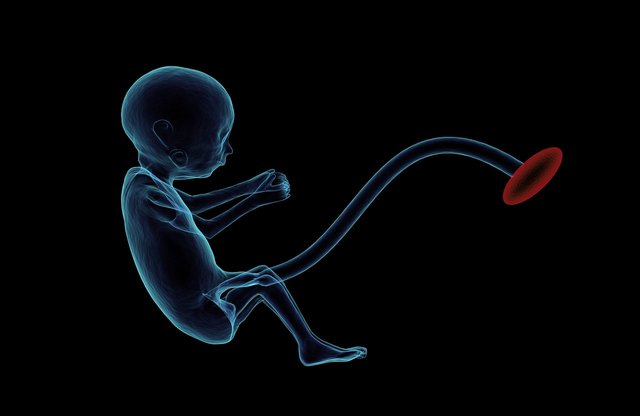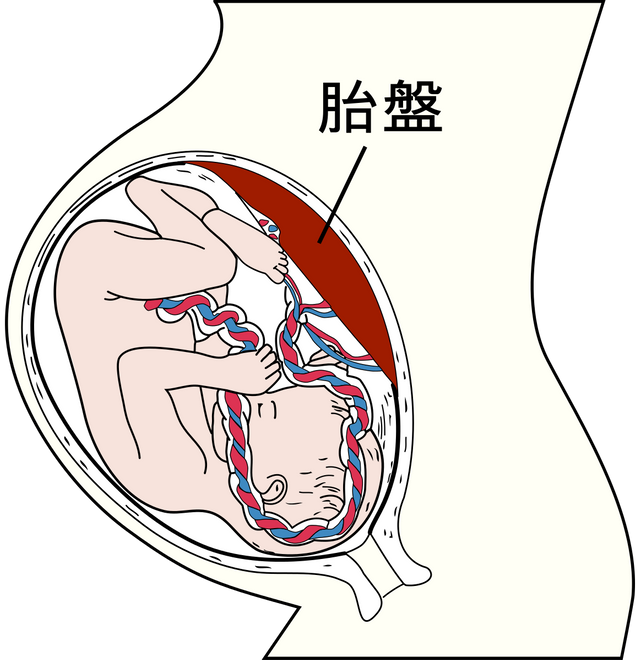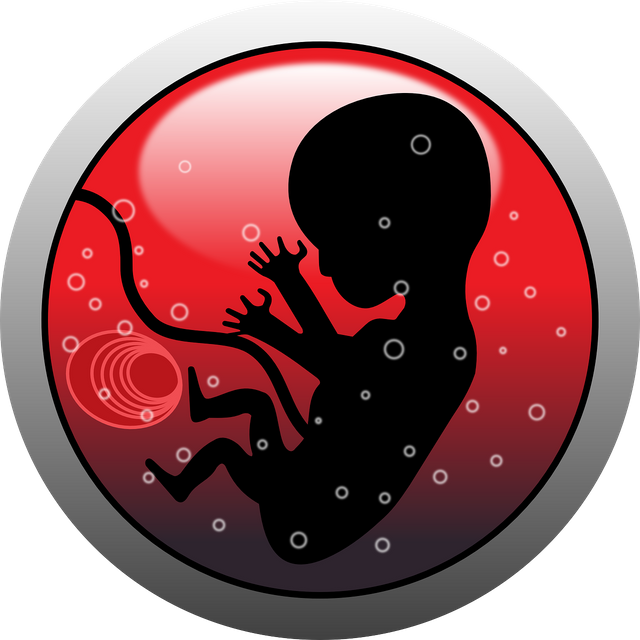IS A HUMAN EMBRYO A PARASITE? - A debatable question

It is an established fact that parasites are organism or living creatures that are totally dependent on another organism for either all or part of their life cycle and also metabolic requirements. They could live inside their host or outside. Since the human embryo somehow actually fit into this description, why then are they not described as parasites. The zygote (which is formed by the fusion of the sperm and a matured egg) penetrates the endometrial through the help of the trophoblast, they attach and obtain food as they develop.
Surfing the internet and reading through several online journals, I was really overwhelmed with what I saw. There were already written articles and facts about what I was actually thinking about. This affirms what a professor in my school always says
"there is no virgin topic; most of what we know or think of has already been worked on by people. The only thing we do is to develop on most of them"
My findings opened and widened my knowledge about the term parasites and having an in depth knowledge has helped along the way.
Women as we all know at a particular stage of their life develop sexual characteristics and under series sexual stages from adolescents to puberty stage, a period at which they are termed matured and fertile. They are fertile in the sense that they are able to conceive after sexual intercourse with the male counterpart.
After conception, the human embryo begins to develop in the endometrium of the female using the placenta as a means of getting nutrients and various metabolic needs from the mother. It remains inside the uterus for roughly more than nine months yet it is not considered as a parasite. Left for me, I would assume and obviously regard the embryo as a parasite because they in one way or the other share some similarities with parasites. There are several reasons as to why the embryo should not be regarded as a parasite. This article in a way presents some of the reasons but they are only objective. I will make several comparison between parasites and the human human embryo and possibly ditch out few attributes they both share, thus leaving you the reader to decide, whether to call them parasites or not.
This remains a debatable question with facts, though the various reasons I will be giving soon might probably not be exhaustive enough to assert or say conclusively that a human embryo is not a parasite.
I will use some certain key word which will be in bold and italicised, they will form the basis of my argument. Below are the few reasons why I feel embryos should not be regarded as parasites.
The specie factor
Firstly, a human embryo is an organism that has the same scientific origin i.e. of the same species (Home sapiens) as the mother and it lives inside the uterus of the mother where it obtains all the necessary nutritional and metabolic requirements. On the other hand, a parasite is an organism of specie which lives in another organism of different species. It also derives nutritional benefits from the organism in the process. If we a to judge based on similarity, then we might start looking at the mode of their feeding. Since they are solely dependent on the mother for food and nutrition and parasites in general happen to also exhibit the same character, this in a way makes them similar.
Considering the source, is it exogenous or endogenous?
Secondly, another reason that might also interest you is that a human embryo is simply a product of fertilization or fusion between the sperm and the egg of the female ovary. This egg is produced from the female ovary during ovulation. After production, it travels from the ovary through the action of the tiny finger like cilia in the epithelial surface of the fallopian to the ampuli where it met by a spermatozoa which fuses with it resulting to the formation of a zygote.
What is means here is that, the embryo is actually formed from within the female and not as a result of an invading organism. On the other hand, a parasite simply is any organism that enters its host to either parasitize or harm the host. Usually they are from external environment. I believe you are now beginning to understand why I was curious to really know why human embryos are not regarded as parasites.
Isolation and contact
Another point worthy of noting is that, the human embryo undergoing it's developmental stages has a direct connection to the uterus of the mother and this connection actually does not last for long as it is only for a short time after which the foetus is cut off and thus becomes confined source within a sac filed with a fluid. This watery compartment which can serve as a shock absorber. This compartment is known as the own amniotic sac. The embryo only makes an indirect contact with the mother through a special structure known as the placenta and the umbilical cord.
Through these structures, they are able to obtain food needed for their catabolic and anabolic activities from the mother and also pass out waste products. On the other hand, a parasite makes a strong direct contact with the host tissues, they most times use some adaptive structures to attach firmly to their host tissues and in the process they are able to obtain the necessary metabolic needs for their developmental activities.
I find this next reason very convincing and strong enough to objectively assert that an embryo is not a parasite.
How the immune system is involved
In the normal physiologic state of the body, it is expected that on introduction or entry of a foreign organism, immune response is expected to be activated. When embryos are present, the mother naturally react by producing humoral antibodies against this embryo, as nature will have it, a protective layer called the
tropholabst which surrounds the embryo inhibit the action of these antibodies. This singular action ensures that the embryo is not rejected by the mother's immune system. The human embryo actually secrets a substance known as phosphocholine and through this compound it is able to ensure that the mother's immune system does not in any way mount an attack on the baby. On the other hand, when parasites enter their host, similar thing happens and this is the production of antibodies against the invading parasite. The major difference here is that, the parasites are mostly destroyed by the immune system of their host because of the fact that they express antigens on their surface which trigger the immune system of their host.
You will agree with me here that, these human embryos also share the similarity of antibody production with the parasite when they are present.
How well are the embryo and parasites connected to their host?
Another point I will also like to buttress on is that, when the embryo invades and attach itself to the mother's uterus, the lining tissues of the endometrial wall physiologically responds by surrounding the embryo. This action is just a way ensuring that the foetus is protected from certain negative factors that are likely to endanger it. Though this protective covering is made, yet it does not in any way totally isolate the foetus from the mother
A connection is made through the placenta between it and the mother. On the other hand, when parasites enter their host, an immune response is usually induced leading to the production of antibodies and also the body sometimes forms a kind of connective tissue around the parasite and in the process totally cuts it off from other tissues around. The take home point here is that antibodies production and total isolation of parasites occur while in the case human embryo, the reverse.
The last but not the least is that, the human embryo that is undergoing development in the uterus of the mother does not in any way cause harm or danger to the mother except in the case of ectopic pregnancy - a situation where the blast cell doesn't implant on the endometrial wall of the uterus or maybe when adequate care is not provided. As long as care and proper nutrition is maintained by the pregnant mother, problem hardly ensues. On the other hand, parasites generally are always harmful to their host after invasion, they can remain in their host and cause several disease. Most times these parasites lead to the death of their host.
Conclusion
With the above reasons, I find necessary to state here that, basiclly a foetus undergoing development in the womb is not necessarily a parasite. Yes, it's quite true that they share some similarities with a parasite but because of the fact that they actually do not pose serious threat to the life of the mother, I would not at this point call them parasites.
What really makes an organism a parasite is their total dependency on their host as well as their disease causing tendency. If you would agree with me, the foetus only stays for about nine months in the womb, after fhis period they are ejected. But in the case of parasites, they are ready to remain in their host as long as their host is alive.
The similarities I talked about earlier includes the eliciting of immune system which produces humoral antibodies, nourishment derivation from the host, and contact with host tissues. These similarities are obviously not enough reasons to term embryos as parasites.
This article is open to constructive criticism if any and I would also love your contribution to the subject matter if you think otherwise.
Thanks for reading
References and further reading
•human foetus a parasite?
•why the human embryo is not a parasite
•why babies aren't actually parasites
•NCBI journal
•differences between a zygote and an embryo
•can a fetus be scientifically and biologically categorized as a parasite



Human_Embryo_Day9.png)

Does the definition of parasite require a change? A debatable question
You got upvoted from @adriatik bot! Thank you to you for using our service. We really hope this will hope to promote your quality content!
Maybe...as long as you have concrete and substantial facts to back it up
You got a 33.33% upvote from @luckyvotes courtesy of @stimialiti!
You got a 100.00% upvote from @sleeplesswhale courtesy of @stimialiti!
This comment has received a 50.00 % upvote from @steemdiffuser thanks to: @stimialiti.
Bids above 0.1 SBD may get additional upvotes from our trail members.
Get Upvotes, Join Our Trail, or Delegate Some SP
You got a 60.20% upvote from @proffit courtesy of @stimialiti!
2-25% Return on investment. Check steembottracker.com for current status
Minimum 0.01 SBD/STEEM to get upvote , Minimum 1 SBD/STEEM to get upvote + resteem
I had a very difficult pregnancy due to my chronic illness. At an appointment a month before my due date, my doctor told me that my baby was a parasite and that we needed to induce me immediately. He said giving birth would immediately fix my deadly issues. I was induced that same day (I was still able to have a vaginal, drug-free natural birth). The same moment that the baby came out, the deadly issues and symptoms stopped. Immediately.
Parasite?
That same baby breastfed for two years (unusually long for USA standards) and refused table food for that two years.
Parasite?
Not exactly, but...
Close enough.
Waoooooooo
Things really happen.
I think i have to agree with you here.
Though there might be some reasons why the baby was no longer accepted by your immune system, it could be that there is an dangerous of fetal material with the maternal material.
Anything can happen, thank God you delevered safely.
Congratulations @cyprianj! You have completed some achievement on Steemit and have been rewarded with new badge(s) :
Click on the badge to view your Board of Honor.
If you no longer want to receive notifications, reply to this comment with the word
STOPTo support your work, I also upvoted your post!
Do not miss the last post from @steemitboard!
Participate in the SteemitBoard World Cup Contest!
Collect World Cup badges and win free SBD
Support the Gold Sponsors of the contest: @good-karma and @lukestokes
Thanks
I think your arguments and points you presented have answered all questions I would possibly ask. But do you know that the mother’s amd foetus’ blood do not mix at any point and this is majorly to prevent an immune response. The foetus is not considered self by the immune system technically, the trophoblast just does a good job of keeping it incognito. Antibodies do not particularly cross the feto-placental unit but immunoglobulin G does so and it really doesn’t pose a threat to the foetus anyway.
Good job man !
Haha.....
When a pro speaks, it is just evident. You are very correct.
Thanks so much for the added knowledge
Congratulations! this post got an upvote by @steemrepo and was manually picked by the curator @yanosh01 to be added on STEEM REPOSITORY, simply comment "YES" and we upload it on STEEM REPO Website.
Want to know more about the Steem Repo project? Contact us on Discord
Yes
This is quite an interesting post. I am surprised by just seeing this after 3 dys. You probably need to interact more with the community (we have said this a lot of time).
Good article by all means.
Thanks so much sir @gentleshaid
Though i have been interacting well, but i guess i have to do more
Thanks for the compliments bro🙏
This is really wonderful, your arguments are objective though,and i like it.
Thanks for reading!
Hi @cyprianj!
Your post was upvoted by utopian.io in cooperation with steemstem - supporting knowledge, innovation and technological advancement on the Steem Blockchain.
Contribute to Open Source with utopian.io
Learn how to contribute on our website and join the new open source economy.
Want to chat? Join the Utopian Community on Discord https://discord.gg/h52nFrV
Well, if the embryo is a parasite then I think, and you will reckon too, that they are those of necessity. Thanks anyway for brinking this forth in more informed and scientific argument, which is quite brilliant and informative.
Thanks and keep steeming!
Thanks bro💖
I have not taken a critical think in this direction until now and sincerely, it is quite a topic to ponder about. Just as you stated, the embryo has unique properties that differentiate it from
otherparasites.How about surrogacy?
That was brilliant!👍😀
Never thought of that as well, but if i would comment on that, i will simply say that it is still not parasitism because they are still of the same specie, its just that the surrogate mother becomes the incubator for the growth and development of the baby in her womb.
But honestly this is a valid point subject to another debate😁
Thanks for this @rharphelle